
Geoffrey of Monmouth was a Catholic cleric from Monmouth, Wales, and one of the major figures in the development of British historiography and the popularity of tales of King Arthur. He is best known for his chronicle The History of the Kings of Britain which was widely popular in its day, being translated into other languages from its original Latin. It was given historical credence well into the 16th century, but is now considered historically unreliable.

Uther Pendragon (Brittonic), also known as King Uther, was a legendary King of the Britons and father of King Arthur.
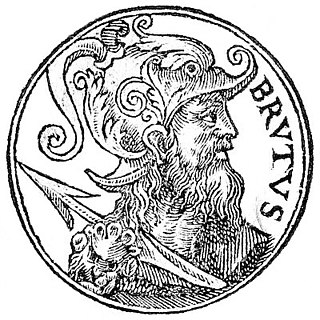
Brutus, also called Brute of Troy, is a legendary descendant of the Trojan hero Aeneas, known in medieval British legend as the eponymous founder and first king of Britain. This legend first appears in the Historia Brittonum, an anonymous 9th-century historical compilation to which commentary was added by Nennius, but is best known from the account given by the 12th-century chronicler Geoffrey of Monmouth in his Historia Regum Britanniae.
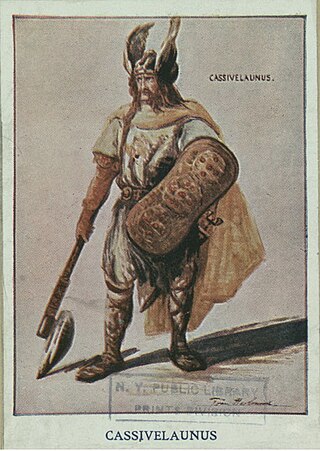
Cassivellaunus was a historical British military leader who led the defence against Julius Caesar's second expedition to Britain in 54 BC. He led an alliance of tribes against Roman forces, but eventually surrendered after his location was revealed to Julius Caesar by defeated Britons.

Leir was a legendary king of the Britons whose story was recounted by Geoffrey of Monmouth in his pseudohistorical 12th-century History of the Kings of Britain. According to Geoffrey's genealogy of the British dynasty, Leir's reign would have occurred around the 8th century BC, around the time of the founding of Rome. The story was modified and retold by William Shakespeare in his Jacobean tragedy King Lear.
Cunedagius was a legendary king of the Britons, as recounted by Geoffrey of Monmouth. He was the son of Henwinus, Duke of Cornwall, and Regan, the daughter of King Leir.
Ferrex was the son of the legendary king Gorboduc of the Britons, and fought with his brother Porrex for the throne, according to Geoffrey of Monmouth.
Porrex I was a legendary king of the Britons as accounted by Geoffrey of Monmouth. He was the son of Gorboduc and his death began a dynastic civil war.
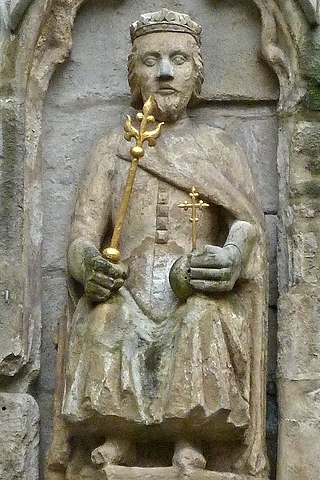
Brennius was a legendary king of Northumberland and Allobroges, as recounted by Geoffrey of Monmouth. He was the son of Dunvallo Molmutius and brother of Belinus, probably based upon one or both of the historical Brenni.
Morvidus was a legendary king of the Britons from 341 to 336 BCE., as recounted by Geoffrey of Monmouth. He was the illegitimate son of Danius by his mistress Tangustela.
Ingenius is a legendary king of the Britons as recounted by Geoffrey of Monmouth's pseudohistorical work Historia Regum Britanniae, written c. 1138 CE. Ingenius was the fourth son of King Morvidus and the brother of Gorbonianus, Archgallo, Elidurus, and Peredurus.
Elidurus the Dutiful was a legendary king of the Britons as recounted by Geoffrey of Monmouth. He was the third son of King Morvidus and brother of Gorbonianus, Archgallo, Ingenius, and Peredurus.

Historia regum Britanniae, originally called De gestis Britonum, is a pseudohistorical account of British history, written around 1136 by Geoffrey of Monmouth. It chronicles the lives of the kings of the Britons over the course of two thousand years, beginning with the Trojans founding the British nation and continuing until the Anglo-Saxons assumed control of much of Britain around the 7th century. It is one of the central pieces of the Matter of Britain.

Dionotus was a legendary king of Cornwall in Geoffrey of Monmouth's Historia regum Britanniae, an account of the rulers of Britain based on ancient Welsh sources and disputed by many historians. Dionotus succeeding his brother Caradocus, and was regent of Britain during the campaigns in Gaul of Emperor Magnus Maximus. The curious thing about this king is that the Welsh chronicles, which parallel most of Geoffrey of Monmouth's book, do not mention this king by name. However, Geoffrey uses Latin versions of Welsh names so he could be referring to Dynod, duke of Cornwall, or Anwn Dynod, Maximus's own son.
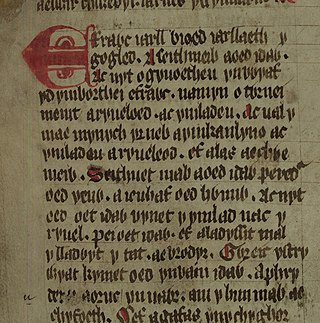
Peredur is the name of a number of men from the boundaries of history and legend in sub-Roman Britain. The Peredur who is most familiar to a modern audience is the character who made his entrance as a knight in the Arthurian world of Middle Welsh prose literature.
Gorbonianus was a legendary king of the Britons as recounted by Geoffrey of Monmouth. He was the eldest son of King Morvidus, and the brother of Archgallo, Elidurus, Ingenius, and Peredurus.
Peredurus is a legendary king of the Britons in Geoffrey of Monmouth's pseudohistorical chronicle Historia Regum Britanniae. According to Geoffrey, he was the youngest son of King Morvidus and brother of Gorbonianus, Archgallo, Elidurus, and Ingenius.
Cador is a legendary Duke of Cornwall, known chiefly through Geoffrey of Monmouth's pseudohistorical Historia Regum Britanniae and previous manuscript sources such as the Life of Carantoc. In Welsh genealogical records, he appears as Cado (Cadwr), the son of Cornish king Geraint. Early sources present him as a relative of King Arthur, though the details of their kinship are usually left unspecified.
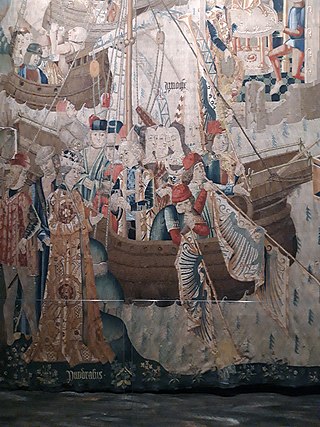
Pandrasus is the fictional king of Greece and father of Innogen in Geoffrey of Monmouth's pseudo-history Historia Regum Britanniae.









